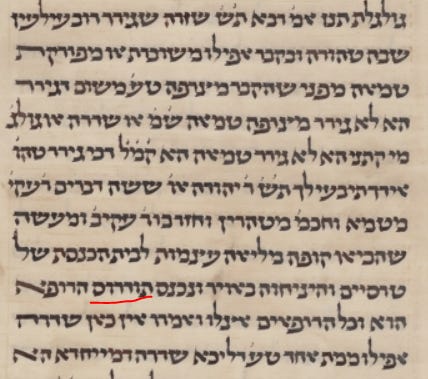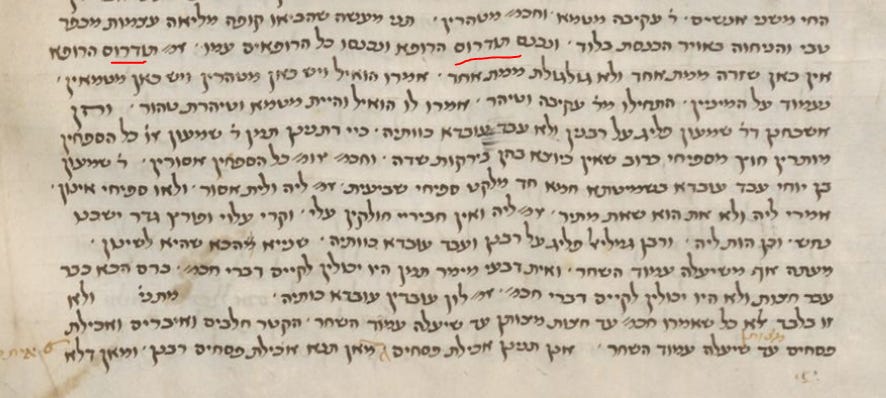Theodorus
Todos? Todros? Theodosius?
One of the great features of Rav Steinsaltz’s Hebrew Talmud translation / commentary is that he takes note of salient variant manuscripts. He doesn’t note all of them, so it is a good idea to check out Dikdukei Soferim or Hachi Garsinan yourself, to decide what might be important. But still, at a glance, you get to see possibly important girsological differences.
On yesterday’s daf, Nazir 52, he noted this:
Thus:
תָּא שְׁמַע, רַבִּי יְהוּדָה אוֹמֵר: שִׁשָּׁה דְּבָרִים רַבִּי עֲקִיבָא מְטַמֵּא וַחֲכָמִים מְטַהֲרִין, וְחָזַר בּוֹ רַבִּי עֲקִיבָא. וּמַעֲשֶׂה שֶׁהֵבִיאוּ קוּפָּה מְלֵאָה עֲצָמוֹת לְבֵית הַכְּנֶסֶת שֶׁל טַרְסִיִּים, וְהִנִּיחוּהָ בַּאֲוִיר, וְנִכְנַס תּוֹדוֹס הָרוֹפֵא וְכׇל הָרוֹפְאִים [עִמּוֹ], וְאָמְרוּ: אֵין כָּאן שִׁדְרָה מִמֵּת אֶחָד.
The Gemara further suggests: Come and hear a resolution from the Tosefta (Oholot 4:2). Rabbi Yehuda says that Rabbi Akiva deems six items impure that the Rabbis deem pure, and Rabbi Akiva later retracted his opinion. And an incident occurred in which they brought a box that was full of bones to the synagogue of blacksmiths [tarsiyyim], and they placed it in an open airspace, not under the roof, so that it would not impart ritual impurity. And Todos the doctor entered and all the other doctors entered with him, and they said, after examining the pile: There is not a full spine from one corpse here.
Where Todos the doctor is alternatively Todos or Theodorus. I don’t know if he is meant to be Jewish, since the incident happened in a synagogue. There were, after all, other Jewish men named Todos, such as Todos of Rome. Theodorus is indeed a secular name.
The Tosefta in Ohalot 4:2 has the incident, and spells the name תיאודריס:
אמר ר' יהודה ששה דברים היה ר"ע מטמא וחזר בו. מעשה שהביאו קופות של עצמות מכפר טביא והניחום באויר ביהכ"נ בלוד ונכנס תיאודריס הרופא וכל הרופאין עמו ואמרו אין כאן שדרה ממת אחד ולא גולגולת ממת אחד אמרו הואיל ויש כן מטמאים ויש כן מטהרין נעמוד למנין התחילו מר"ע וטיהר אמרו לו הואיל ואתה שהיתה מטמא טהרת יהו טהורין אמר ר"ש ועד יום מיתתו של ר"ע היה מטמא ואם משמת חזר בו איני יודע.
So too Yerushalmi Berachot 1:1, with תּוֹדְרוֹס.
וְהֵן אַשְׁכְּחָן דְּרִבִּי עֲקִיבָא פַּלִּיג עַל רַבָּנִין וְלָא עָבַד עוּבְדָּא כְּוָתֵיהּ. כְּיַי דְּתַנִּינָן תַּמָּן הַשִּׁדְרָה וְהַגּוּלְגּוֹלֶת מִשְּׁנֵי מֵתִים. אֵבֶר מִן הַמֵּת מִשְּׁנֵי מֵתִים. אֵבֶר מִן הַחַי מִשְׁנֵי אֲנָשִׁים. רִבִּי עֲקִיבָא מְטַמֵּא וַחֲכָמִים מְטָהֲרִין. תַּנִּי מַעֲשֶׂה וְהֵבִיאוּ קוּפָּה מְלֵאָה עֲצָמוֹת מִכְּפַר טַּבִּי וְהִנִּחוּהָ בָּאַוִּיר הַכְּנֶסֶת בְּלוֹד. וְנִכְנַס תּוֹדְרוֹס הָרוֹפֶא וְנִכְנְסוּ כָּל־הָרוֹפְאִים עִמּוֹ. אָמַר תּוֹדְרוֹס הָרוֹפֶא אֵין כַּאן שִׁדְרָה מִמֵּת אֶחָד וְלֹא גוּלְגּוֹלֶת מִמֵּת אֶחָד. אָֽמְרוּ הוֹאִיל וְיֵשׁ כַּאן מְטָהֲרִין וְיֵשׁ כַּאן מְטַמְּאִין. נַעֲמוֹד עַל הַמִּנְיָן. הִתְחִילוּ מֵרִבִּי עֲקִיבָא וְטִהֵר. אָֽמְרוּ לוֹ הוֹאִיל וְהָיִיתָ מְטַמֵּא וְטִיהַרְתָּ טָהוֹר.
though for these, we aren’t going through manuscripts looking for variants.
Hachi Garsinan lists the following variants.
So for printings, Vilna follows Venice in our Todos. Vatican 110 has Todros, with the daled and resh.
Munich 95 has what is a likely error, היאורידי' where the final apostrophe is for a tav, and swaps the daled and the resh.
So it preserved much of the fuller spelling of the name, but get confused about the particulars, because the name is so unfamiliar.
I suppose that where Rav Steinsaltz says that Theodorus is in manuscript, he was either privy to other manuscripts or intended the Tosefta parallel.
Here is the Leiden Yerushalmi text, by the way:
Dr. Todos also features in Mishnayot Bechorot 4:4, where it is rendered as Theodosius.
מִי שֶׁאֵינוֹ מֻמְחֶה וְרָאָה אֶת הַבְּכוֹר וְנִשְׁחַט עַל פִּיו, הֲרֵי זֶה יִקָּבֵר, וִישַׁלֵּם מִבֵּיתוֹ. דָּן אֶת הַדִּין, זִכָּה אֶת הַחַיָּב וְחִיֵּב אֶת הַזַּכַּאי, טִמֵּא אֶת הַטָהוֹר וְטִהֵר אֶת הַטָּמֵא, מַה שֶּׁעָשָׂה עָשׂוּי וִישַׁלֵּם מִבֵּיתוֹ. וְאִם הָיָה מֻמְחֶה לְבֵית דִּין, פָּטוּר מִלְּשַׁלֵּם. מַעֲשֶׂה בְפָרָה שֶׁנִּטְּלָה הָאֵם שֶׁלָּהּ, וְהֶאֱכִילָהּ רַבִּי טַרְפוֹן לַכְּלָבִים, וּבָא מַעֲשֶׂה לִפְנֵי חֲכָמִים וְהִתִּירוּהָ. אָמַר תוֹדוֹס הָרוֹפֵא, אֵין פָּרָה וַחֲזִירָה יוֹצְאָה מֵאֲלֶכְּסַנְדְּרִיָּא עַד שֶׁהֵם חוֹתְכִין אֶת הָאֵם שֶׁלָּהּ, בִּשְׁבִיל שֶׁלֹּא תֵלֵד. אָמַר רַבִּי טַרְפוֹן, הָלְכָה חֲמוֹרְךָ טַרְפוֹן. אָמַר לוֹ רַבִּי עֲקִיבָא, רַבִּי טַרְפוֹן, פָּטוּר אַתָּה, שֶׁאַתָּה מֻמְחֶה לְבֵית דִּין, וְכָל הַמֻּמְחֶה לְבֵית דִּין פָּטוּר מִלְּשַׁלֵּם:
In a case involving one who is not an expert, and he examined the firstborn animal and it was slaughtered on the basis of his ruling, that animal must be buried, and the non-expert must pay compensation to the priest from his property. Apropos the previous mishna, which taught that a judge who was an expert for the court and who erred is exempt from payment, this mishna teaches: There was an incident involving a cow whose womb was removed, and when Rabbi Tarfon was consulted he ruled that it is an animal with a wound that will cause it to die within twelve months [tereifa], which is forbidden for consumption. And based on the ruling of Rabbi Tarfon, the questioner fed it to the dogs. And the incident came before the Sages of the court in Yavne, and they ruled that such an animal is permitted and is not a tereifa. And Theodosius [Todos] the doctor said: A cow or pig does not emerge from Alexandria of Egypt unless the residents sever its womb so that it will not give birth in the future. The breeds of cows and pigs in Alexandria were of exceptional quality and the people of Alexandria did not want them reproduced elsewhere. The fact that these animals lived long lives after their wombs were removed proves that the hysterectomy did not render them tereifot. Upon hearing this, Rabbi Tarfon said: Your donkey is gone, Tarfon, as he believed he was required to compensate the owner for the cow that he ruled to be a tereifa. Rabbi Akiva said to him: Rabbi Tarfon, you are an expert for the court, and any expert for the court is exempt from liability to pay.
who testified that a hysterectomy doesn’t render an animal a treifa since they regularly do so when exporting cows and pigs from Alexandria. Theodosius is also a fine name.
Here is Ktav Yad Kaufmann, where both daled and resh appear:
This Mishnah appears in Bechorot 28b, so we could check out all those variant texts if we wanted. Note the question marks where the scholars aren’t entirely sure of the letters.
We should also rightly check out instances of Todos of Rome, Todos Ish Romi (the fellow who prepared the gedi mekulas), as appearing in Berachot 19a, Pesachim 53a, and Beitza 23a, as well as various Yerushalmis and how those are spelled or vary. I just checked Pesachim, and don’t see any variation from Todos. Though this is not the same person, so the name might be different, Theodosius vs. Theodorius.
Regardless, we see again the daled / resh confusion. I say “see again” because of the recent post about Miriam of Tadmor:










